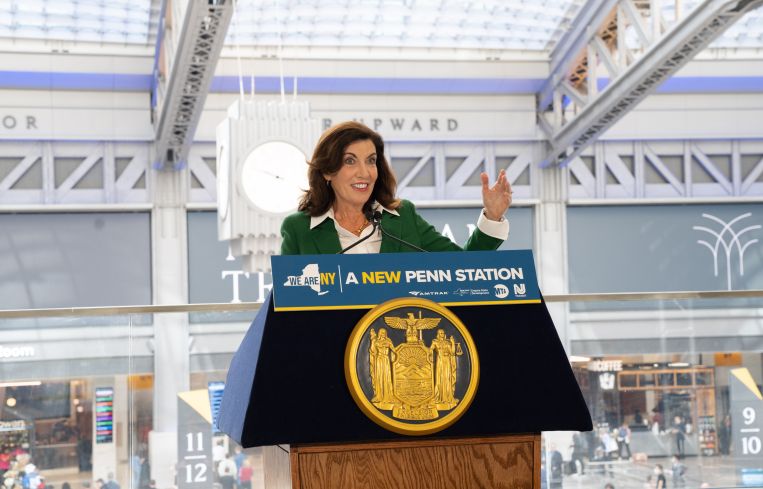Hochul Moves Penn Station Revitalization Into Design Phase
By Mark Hallum June 9, 2022 12:20 pm
reprints
Gov. Kathy Hochul lamented the loss of the original Pennsylvania Station on Thursday, and promised to reverse the architectural mistakes of the past.
But a clear picture of what Penn Station will look like is still forthcoming as the Hochul administration and state agencies continue to make minor changes to the aesthetics of the transit hub, such as removing bulky beams and adding new entrances.
In a follow-up to a November announcement that there would be revisions to the Penn Station redevelopment plan — formerly known as the Empire Station Complex under disgraced Gov. Andrew Cuomo — Hochul said that the design phase for the new transit hub is underway.
The state released a request for proposals (RFP) Thursday to find firms to redesign Penn Station, a much-reviled below-ground transit hub beneath Madison Square Garden and across the street from the new Moynihan Train Hall. RFPs will be due July 28.
“This isn’t just any transit hub. It’s the busiest transit hub in North America in the Western Hemisphere,” Hochul said during her remarks in Moynihan Train Hall. “So it’s the understatement of the century to say that Penn Station is in dire need of repair.”
The Hochul administration, the Metropolitan Transportation Authority (MTA) and Amtrak will be reviewing proposals that include a 460-foot atrium in the station to bring natural light to the cavern that over 650,000 people commuted through during pre-pandemic times.
“The reimagined Penn Station will be on a single level. Imagine that with broad concourses and high ceilings [compared to the] people you saw packed like sardines,” Hochul said. “It’ll be larger than the concourse space of Moynihan Hall and the Great Hall of Grand Central Terminal. And I love this, 460-foot-high atrium and a skylight that reminds you that, yes, the heavens are out there still, despite the feeling that you may be living in hell.”
Hochul, who anticipates improved public space, 1,800 new residences and 450 affordable housing units to be built into the plan, said the public outreach process will continue. But activists may be less inclined to accept Hochul’s plan as demolition of the Hotel Pennsylvania — the last vestige of McKim, Mead and White’s original Penn Station complex — goes into high gear.
Controversy surrounding the planned multiple skyscrapers to be built by Vornado Realty Trust and other developers, which the state said will help fund parts of the Penn Station redevelopment, still has not deterred MTA officials such as chairman Janno Lieber as well as Mayor Eric Adams from backing the project.
“We’re going to make sure this project is a project that’s built by union jobs,” Adams said. “It’s a project that is going to ensure that people are employed. It’s a project that’s going to become the sun that will use this gravitational pull to shine light on all that’s great about this region.”
Not everybody’s convinced the office developments would fully foot the bill of improving the much-loathed station. A report from the Independent Budget Office found the state will need between $8 billion and $10 billion for the work, but taxpayers could be left to foot the bill because of a lack of demand for office space caused by the COVID-19 pandemic.
However, Holly Leicht, an adviser to the Penn Station project for the state’s Empire State Development Corporation, previously told Commercial Observer that the new developments could be a hot commodity because of the high demand for new, Class A office space.
Lieber, a former Silverstein Properties executive responsible for much of the redevelopment of the World Trade Center campus after the destruction of 9/11, said the state must work quickly to finish the Penn Station revitalization before its train capacity is increased with addition of Metro-North Railroad service to the station. Metro-North currently runs trains out of Grand Central Terminal.
“Before Metro-North commuters come into Penn Station in four or five years, we must take advantage of that window of opportunity,” Lieber said.
New Jersey Gov. Phil Murphy and Amtrak chairman Tony Coscia leaned on the importance of the revitalization of the station for commuters from across the Hudson River following the recent federal approval for an environmental review of the $11 billion Gateway project, which will replace the century-old train tunnels currently in use.
Mark Hallum can be reached at mhallum@commercialobserver.com.



